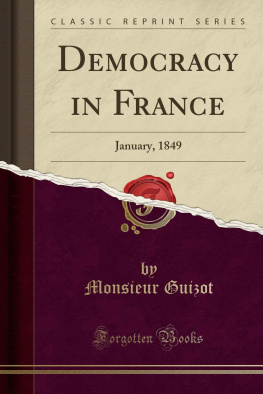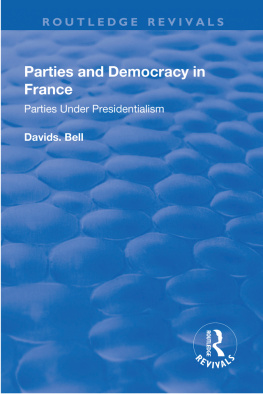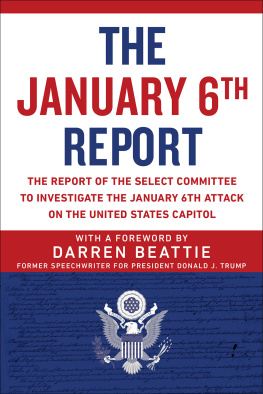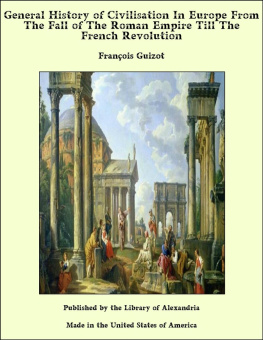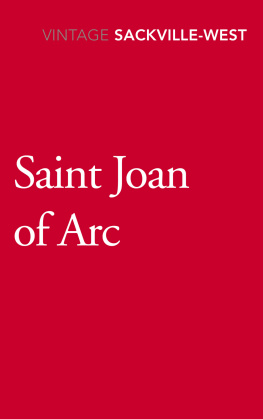DEMOCRACY IN FRANCE.
FOURTH EDITION.
DEMOCRACY IN FRANCE.
JANUARY, 1849.
B Y M O N S I E U R G U I Z O T.
FOURTH EDITION.
LONDON:
JOHN MURRAY, ALBEMARLE STREET.
1849
LONDON: PRINTED BY W. CLOWES AND SONS, STAMFORD STREET.
I venture to believe that nothing will be found in the following pages which bears the impress of my personal situation. While events of such magnitude are passing before his eyes, a man who did not forget himself would deserve to be for ever forgotten. I have thought of nothing but the situation of my country. The more I reflect upon that, the more I am convinced that the evil which lies at the root of all her evils, which undermines and destroys her governments and her liberties, her dignity and her happiness, is the evil which I attack;the idolatry of Democracy.
Whether the accession of M. Louis Napolon Bonaparte to the Presidency of the Republic will be found an efficacious remedy for this disease, the future will show. What I have said here after the election of M. Louis Napolon Bonaparte, I should have equally said, without the slightest alteration, if General Cavaignac had been elected. It is not to individuals, but to society itself, that great social truths are addressed.
CHAPTER I.
WHAT IS THE SOURCE OF THE PREVALENT EVIL?
Mirabeau , Barnave, Napoleon, and Lafayette, who died at distant and very dissimilar periods, in bed or on the scaffold, in their own country or in exile, all died under the influence of one sentimenta sentiment of profound melancholy. They thought their hopes deceived, their labours abortive. They were assailed by doubts of the success of their cause, and by misgivings as to the future.
King Louis-Philippe reigned above seventeen years, for more than eleven of which I had the honour to be his minister. If to-morrow it pleased God to summon us into his presence, should we quit this earth very confident in the future destiny and the constitutional order of our country?
Is then the French Revolution destined to give birth only to doubt and deception?to bury all its triumphs under ruins?
Yes: so long as France shall suffer the true and the false, the upright and the perverse, the practicable and the chimerical, the salutary and the pestilent to be constantly mingled and confounded in her opinions, her institutions, and the government of her affairs, such will be the unfailing and inevitable result.
Until a people which has gone through a great revolution has passed on the principles, the passions, and the doctrines which have led to this revolution, a sentence like that which shall be passed on all human things at the Last Day, severing the wheat from the tares, and the corn from the straw that shall be cast into the fire, it can never surmount the perils, nor reap the advantages, of the struggle in which it has been engaged.
So long as this judgment is deferred, chaos reigns; and chaos, if prolonged in the midst of a people, would be death.
Chaos is now concealed under one wordDemocracy.
This is now the sovereign and universal word which all parties invoke, all seek to appropriate as a talisman.
The Monarchists say, Our Monarchy is a Democratic Monarchy: therefore it differs essentially from the ancient Monarchy, and is adapted to the modern condition of society.
The Republicans say, The Republic is Democracy governing itself. This is the only form of government in harmony with a democratic society, its principles, its sentiments, and its interests.
Socialists, Communists, and Montagnards require that the republic should be a pure and absolute democracy. This, in their estimation, is the condition of its legitimacy.
Such is the power of the word Democracy, that no government or party dares to raise its head, or believes its own existence possible, if it does not bear that word inscribed on its banner; and those who carry that banner aloft with the greatest ostentation and to the extremest limits, believe themselves to be stronger than all the rest of the world.
Fatal idea, which incessantly excites and foments social war amongst us! This idea must be extirpated; for on its extirpation depends social peace, and, in her train, liberty, security, prosperity, dignity, all the benefits, material or moral, which social peace alone can ensure.
The following are the causes to which the word democracy owes its power.
It is the banner of all the social hopes and ambitions of man,pure or impure, noble or base, rational or irrational, possible or chimerical.
Now it is the glory of man to be ambitious. He alone, of all created beings, does not passively resign himself to evil; he alone incessantly aspires after good; not only for himself, but for his fellow-creatures. He respects and loves the race to which he belongs; he wishes to find a remedy for their miseries, and redress for their wrongs.
But man is no less imperfect than he is ambitious. Amidst his ardent and unceasing struggles to eradicate evil and to achieve good, every one of his virtuous inclinations is accompanied by an evil inclination which treads closely on its heels, or strives with it for precedence. The desire for justice and the desire for vengeancethe spirit of liberty and the spirit of tyrannythe wish to rise and the wish to abase what has risenthe ardent love of truth and the presumptuous temerity of fancied knowledge;we may fathom all the depths of human nature; we shall find throughout, the same mingled yet conflicting qualities, the same danger from their close and easy approximation.
To all these instincts, at once contrary and parallel,to all indiscriminately, the bad as well as the good,the word Democracy holds out an interminable vista and infinite promises. It fosters every propensity, it speaks to every passion, of the heart of man; to the most generous and the most shameful, the most moral and the most immoral, the gentlest and the harshest, the most beneficent and the most destructive: to the former it loudly offers, to the latter it secretly and dimly promises, satisfaction.
Such is the secret of its power.
I am wrong in saying, the secret. The word Democracy is not new, and in all ages it has signified what it signifies now. But what is new and proper to our times is this: the word Democracy is now pronounced every day, every hour, and in every place; and at every time and place it is heard by all men. This formidable appeal to all that is most potent, for good and for evil, in man and in society, was formerly heard only transiently, locally, and among certain classes, which, though bound to other classes by the ties of a common country, were distinct and profoundly different from them. They lived at a distance from each other; each obscurely known to the other. Now there is but one society; and in this society there are no more lofty barriers, no more great distances, no more mutual obscurities. Whether it be false or true, noxious or salutary, when once a social idea arises, it penetrates everywhere, and its action is universal and constant. It is a torch that is never extinguished; a voice that is never wearied or hushed. Universality and publicity are from henceforth the conditions of all the great provocations addressed to men,of all the great impulses given to society.

